Welcome everyone to another episode of Mega Archive, your monthly examination of the best (and the rest) of what the Sega Genesis/Mega Drive had to offer the world. 1993 continues apace with another mix of, and let's be honest here, mostly trash. Well, that's perhaps too harsh, but my god do we have a continued downward incline of quality with some of the "highlights" this episode. That said, we do have some genuinely great games too, and those are what keep me going as we move ever closer to 1994 on the horizon. (Not that 1994 will suddenly improve things, but hey. Sometimes reading all about bad games can be just as fun. What combination of factors led to such messes, and so on.)
Let's take stock here before we get into the list proper: three sports games, two licensed games, more Amiga refugees, the most flagrant Sonic clone yet, and something that's not even a game. Oh, and another case of a second sequel to a Sega classic I didn't even know had a first sequel, following from Golden Axe III from a few entries ago. I'd make excuses and say we'll have a banger assortment ready for review in April to make up for it—which will be a Mega Archive CD, rejoice—but it's honestly going to get worse before it gets better now that we're in the shovelware rush that was the 1993 holiday season. Good thing I'm only doing wiki research for these and not trying to play them for real, huh? I'll leave the Blight Club games to the experts.
Oh right, we also hit 500 games covered on Mega Archive. Whee. I'd be more excited for the milestone if it wasn't for the fact we're nowhere near done. Still, that's a lot of Sega tapes, huh? Maybe I should make some graphs or something. Instead of graphs for now, how about this enormous spreadsheet of the Mega Archive, its many featured games, and links to previous entries? (Good thing to keep open as you read this in case you want to refer back to previously-covered games whenever I mention one.)
Part XXXIX: 491-500 (October '93 - November '93)
491: Wonder Library / Electronic Book Decoder for X'Eye
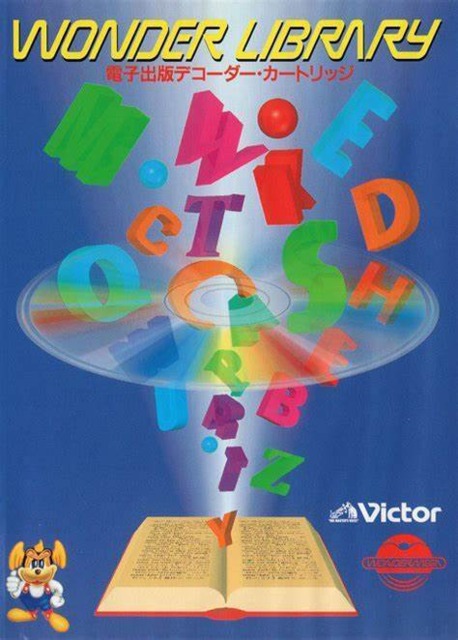
- Developer: Victor Entertainment
- Publisher: Victor Entertainment
- JP Release: 1993-10-08
- NA Release: 1995
- EU Release: N/A
- Franchise: N/A
- Genre: Miscellaneous
- Theme: Reading is Fundamentally Not What the Mega Drive was About
- Premise: Hey kids, *sits on a chair backwards* high-scores and Tetris kill screens are all good and great but you know what's really poggers? Literacy.
- Availability: Extremely rare cart. Might be the least available thing we've covered yet.
- Preservation: So, this thing. It's an ebook reader that was built to be used on the Wondermega, otherwise known as the X'Eye in North America, which was a Mega Drive and Sega CD hybrid. You put this cart in the Mega Drive slot and then an .EBXA format ebook in the CD drive and then you could read it on your Wondermega, I think is the idea. As you might expect I couldn't really get too far with the emulated version, but I did see the title screen. Remember Wonder Dog? He's all over this software too; I guess they were trying to turn him into a mascot for the platform. Sega co-created the Wondermega with Victor, who are also the ones who put this "game" out. The X'Eye fared even worse: its pack-in "games" were Prize Fighter, Compton's Interactive Encyclopedia, and a karaoke CD that included "Achy Breaky Heart" and "Two Princes". Yikes. Anyway, a hybrid Mega Drive/Sega CD made some amount of sense at the time, but these peripheral products for it far less so.
- Wiki Notes: There's no page for it and I didn't make one. It's ebook reader software, after all. I'm including it on here anyway though because it's kind of neat.
492: Columns III: Revenge of Columns / Columns III: Taiketsu! Columns World
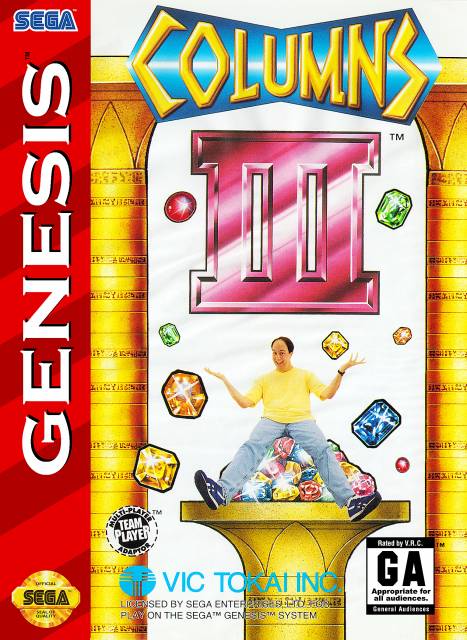
- Developer: Sega
- Publisher: Sega (JP) / Vic Tokai (NA)
- JP Release: 1993-10-15
- NA Release: March 1994
- EU Release: N/A
- Franchise: Columns
- Genre: Puzzle
- Theme: Isn't It Ionic, Don't You Think?
- Premise: Is this puzzle sequel more like Tetris or Puyo Puyo? Little of column A, little of column B.
- Availability: Available on Steam, along with the first game. The second can be bought on Switch.
- Preservation: We move onto Sega's own match-3 puzzle game franchise, something they tried to make happen several times with mixed results, and with Columns III specifically we see the pendulum shift closer to Puyo Puyo as it takes on a more madcap cartoonish aesthetic and a more multiplayer-focused set of mechanics. The old Columns had you trying to hold on for as long as you could, but this one's all about crushing your opponent in as definitive and humiliating a way as possible. That means stacking up points you earn from breaking gems and spending them on attacking your opponent, which has the added benefit of destroying whatever their current piece is: bonus points if you can do it just before it lands in a spot that sets off a major chain for them (or was a super valuable magic gem). If you're proficient in setting up combos, you can also dump special trap gems on your opponent that messes up their field in a similar way to the power-ups in Tetris Battle Gaiden: penalties like making their whole field monochrome, or flipped upside down. This sequel's multiplayer focus was inspired by the arcade-only second game, Columns II: The Voyage Through Time, and would later make it to arcades itself along with (after a long while) Wii Virtual Console and Steam. It's also one of the fifty or so MD games to support the Team Player/Sega Tap peripheral, which allowed for up to five simultaneous players just in case you had four friends you wanted to subject to Columns.
- Wiki Notes: Very little was needed here. Just a header and minor edits.
493: Pebble Beach Golf Links
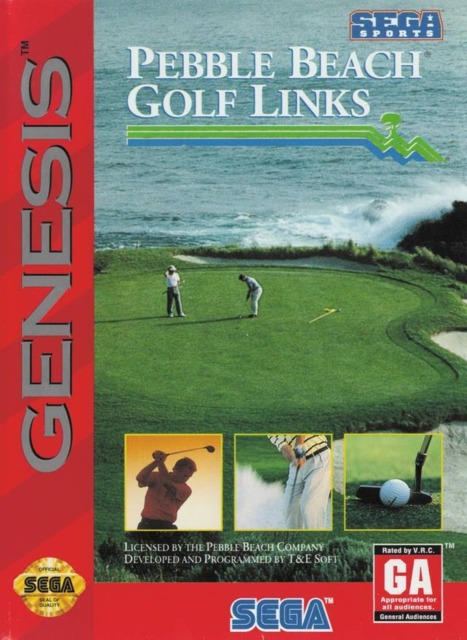
- Developer: T&E Soft
- Publisher: Sega
- JP Release: 1993-10-29
- NA Release: January 1994
- EU Release: April 1994
- Franchise: True Golf Classics / New 3D Golf Simulation
- Genre: Golf
- Theme: Golf
- Premise: Golf
- Availability: Probably a little too dated to see any rereleases.
- Preservation: Oh boy. Golf. This is the first of T&E Soft's flagship golf series, New 3D Golf Simulation (True Golf Classics in the US), to hit the Mega Drive and it would be followed by three others named for and set on different courses (Pebble Beach Golf Links is in California, but you probably knew that). However, this was the only one to get a localization. The Saturn would get even more of the things, so I'll look forward to the day we get to that system (no promises; that would be a bleak project regardless of what Isekai Ojisan might tell us). As you could reasonably interpret from the name of the franchise, it's going for a simulation-style that uses basic vectors and the like to give you a vague sense of distance from the hole, though you'll be relying on information provided by the UI most of the time. While there are a huge amount of numbers and gauges it's fairly accessible, albeit incredibly slow due to all the 3D gumming up the works; I imagine the next-gen versions play a little faster. The only other T&E-developed game we've seen so far on the Mega Archive is Super Hydlide back near the system's launch, so this might be a step up (Psy-O-Blade and UndeadLine were theirs too, but the ports were handled by other companies). It'll be nothing but golf games from them from here on out though, including one more before we're done with 1993.
- Wiki Notes: SNES double dip. Needed all MD releases/box art/screenshots.
494: Awesome Possum Kicks Dr. Machino's Butt!
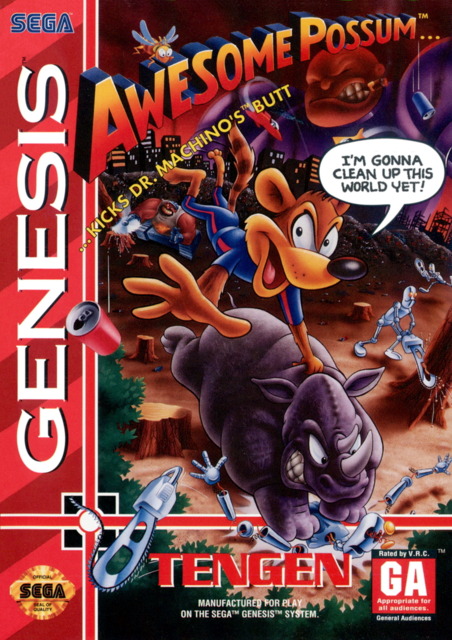
- Developer: Tengen
- Publisher: Tengen
- JP Release: 1993-12-25
- NA Release: November 1993
- EU Release: N/A
- Franchise: N/A
- Genre: Platformer (Mascot)
- Theme: Environmentalism, Oddly Enough.
- Premise: "I'll let you copy my homework but change a few things so no-one finds out." - Sonic Team, 1993.
- Availability: Awesomely out of print.
- Preservation: I know it seems crazy in this post-Superstars world but there was a time where people were eager to copy Sonic and rake in at least some fraction of the dough Sega made on the games and the license via his various extracurricular endeavors. Tengen was probably getting bored of porting over Atari arcade games made in the mid-80s and took a chance on a Sonic-killer with Awesome Possum, which aimed to deliver what the hedgehog was lacking: sanctimonious eco-warrior condemnation that took the form of esoteric nature quizzes between levels that you were made to feel bad about whenever you got one wrong. Love to get talked down to about how little recycling I do while jumping on robots as a cartoon rodent (fine, marsupial). Attempts to replicate the speed of Sonic, already dangerously close to being unplayable, coupled with Bubsy's loquaciousness (why was he an inspiration?) sees Awesome Possum fall way short of the mark of being a decent platformer, let alone the type of paragon that could topple Sonic from his throne. Still, points for trying.
- Wiki Notes: Respect, this page was already pretty complete. Just needed the US box art (weird, since we had the JP one already) and a header image. That image of a gallery of animals looking disdainfully at you for a wrong trivia answer seemed perfect, somehow.
495: Pro Moves Soccer
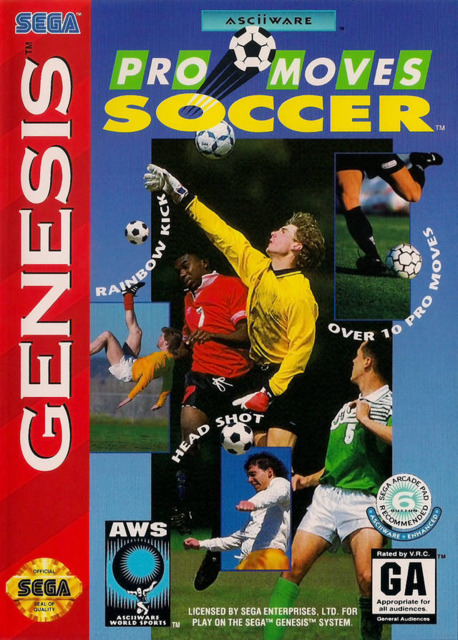
- Developer: ASCII Entertainment / BGS Development
- Publisher: ASCII Entertainment
- JP Release: N/A
- NA Release: November 1993
- EU Release: N/A
- Franchise: N/A
- Genre: Soccer
- Theme: Soccer
- Premise: Soccer
- Availability: Nothin' doin'.
- Preservation: I couldn't say I was expecting much from a US-exclusive soccer game (way to pick the most soccer-friendly territory there, lads) that our own wiki had never heard of, but I was hit with quite the upbeat jam as soon as the title screen loaded. Turns out the composer for this game was one Jesper Kyd, of eventual Hitman and Assassin's Creed fame, who really was a kyd at the time: 21 years old and freshly emerged from the homegrown Amiga demo scene as a fledgling pro VGM composer. This is one of his earliest known game projects: he and his company Zyrinx (a proto-IO Interactive) would go on to make Sub-Terrania for Genesis the following year. Zyrinx was subcontracted here on behalf of BGS Development, the Danish half of this Europe/Japan team-up (again, the two regions that did not receive this soccer game) with computer game and peripheral developers ASCII; they'd worked together previously on the top-down racer Double Clutch, and after this neither of them would work on a Mega Drive game again (though ASCII would be very active on the Saturn). As for the game, well... it's soccer. It's not even good soccer. That's why I filled most of this blurb with behind-the-scenes stuff. Since it's a US-based game and they don't really follow the local teams so much, it exclusively features 32 national sides including "Cameroun", "Rumania", and the globally-acknowledged soccer powerhouse that is the Jamaican national team (this was the year Cool Runnings came out, so maybe representing Jamaican sports was just the trend at the time).
- Wiki Notes: New page! Don't see these too often. Just wish it was for a more interesting game.
496: The Chaos Engine / Soldiers of Fortune
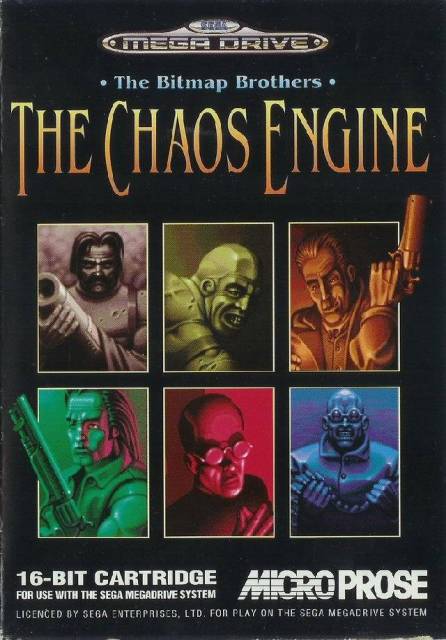
- Developer: The Bitmap Brothers
- Publisher: Spectrum HoloByte (NA) / MicroProse (EU)
- JP Release: N/A
- NA Release: November 1993
- EU Release: July 1994
- Franchise: The Chaos Engine
- Genre: Shooter
- Theme: Steampunk
- Premise: Victorian-era UK has been devastated from within due to a retro-engineered "Chaos Engine" computer and its endless hordes of mutated creatures and automatons. Sort of like a clockwork Skynet. A group of mercenaries enter the beleagured nation to destroy the source of the ruin.
- Availability: It's on Steam, or at least the PC version is.
- Preservation: Here we are with The Chaos Engine, the fourth Bitmap Brothers game to make it to the Mega Drive and probably the best known of theirs outside the UK (albeit under the name Soldiers of Fortune instead). It's a top-down shooter with multiple playable protagonists and a grim 2000AD steampunk aesthetic, named after and based loosely upon the William Gibson/Bruce Sterling novel The Difference Engine which kickstarted the steampunk genre in much the same way Gibson's earlier Neuromancer did for cyberpunk (Gibson himself seems like a very nice guy, so why he keeps inventing -punk subgenres is beyond me). As I've said about every previous Bitmap Brothers game featured on the Mega Archive, it looks great but plays kinda whatever; the visuals were always enough to charm the '90s British gaming press into giving these middling games rave reviews which, well, I never had a whole lot of respect for those guys even if I do live here. The Chaos Engine is ideally suited for two players, since it's a bit tough to challenge solo, and the many characters offer different ratios of hardiness and skill versatility: it's usually best to be the tank yourself and depend on your AI companion's support abilities.
- Wiki Notes: SNES double dip. Just minor edits.
497: Cliffhanger
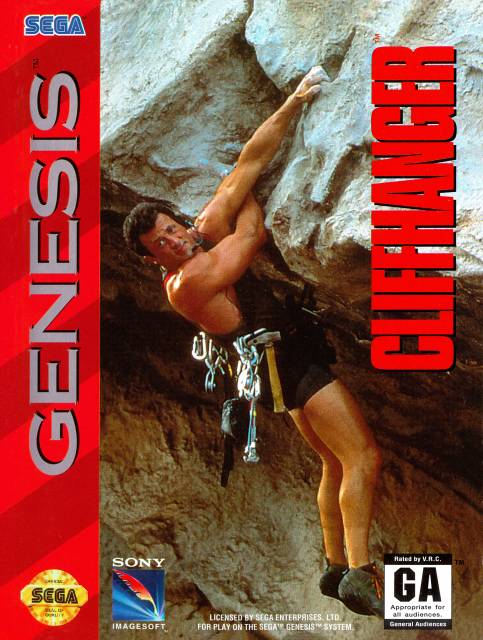
- Developer: Malibu Interactive
- Publisher: Sony Imagesoft
- JP Release: N/A
- NA Release: November 1993
- EU Release: November 1993
- Franchise: N/A
- Genre: Brawler
- Theme: Never Letting Go
- Premise: John Lithgow, back when he used to be a scary presence instead of a goofy one, has stolen a bunch of money from the US Treasury and only Sly Stallone's guilt-ridden former mountain ranger can stop him and his gang of merc thieves. Also Michael Rooker's here too.
- Availability: Licensed game.
- Preservation: Part of the fun of this feature for me is getting to relive my memories of all the crappy '90s action movies that were deemed important enough to get video game adaptations. To be clear, I love crappy '90s action movies as much as I do crappy 16-bit video games (which is to say, a lot) so this is right in my wheelhouse. I won't regale the whole plot here—I recommend just watching it as there's much to appreciate in how schlocky it is (I'll just say someone watched a whole lot of Die Hard back then (it was me))—but the genre the developers landed on was a belt-scroller brawler which, honestly, kinda suits the movie. You still get guns but it's mostly punching and maybe some climbing sequences. Not going to claim for a second that it's actually good (like most licensed games of the era, it feels very hurried) but how many Nintendo games have Lithgow as a final boss? It's just this and Harry and the Hendersons for NES (and man, did that game go off script). We'll be seeing this game again real soon on Mega Archive CD, as it—like most Genesis-to-Sega CD conversions—saw enough new content to be considered a separate entity.
- Wiki Notes: SNES double-dip. Screenshots and release edits.
498: Disney's Aladdin
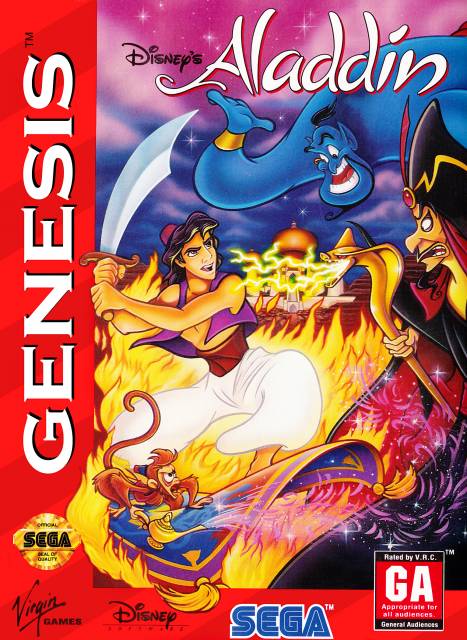
- Developer: Virgin Games
- Publisher: Sega
- JP Release: 1993-11-12
- NA Release: November 1993
- EU Release: 1993-11-11
- Franchise: Disney
- Genre: Platformer
- Theme: "A Whole New World" is One of Them
- Premise: Homeless NEET catfishes a rich girl by pretending to be a foreign prince and gets away with it and they end up together and everything's just fine. Also, like Pekora, he bought a faqin monkey?!
- Availability: Digital Eclipse revamped it and made it available on many modern platforms. Downside is you have to buy The Lion King with it. (SNES Aladdin is DLC, too bad.)
- Preservation: As far as Disney-licensed stuff is concerned, Virgin Games was looking to take Capcom's crown as the King of the Swingers, the Jungle VIP (wait, that's the other game) and it's clear from Disney's Aladdin that they just can't wait to be king (...) by how adroitly they took the license and turned it into a great-looking platformer with plenty of surprises and a pretty decent approximation of the movie's score. I think this was the only Virgin Disney platformer I ended up liking enough to complete: the ones that followed felt worse to play and were way harder besides. I guess kudos are in store for not just taking the obvious route and making a Prince of Persia ersatz. I think it was after this game that Virgin Games officially became Virgin Interactive, but I don't think our wiki makes the distinction and nor should it.
- Wiki Notes: It was missing the JP box art and release. They got that Aladdin in Japan too, turns out.
499: Dragon's Revenge
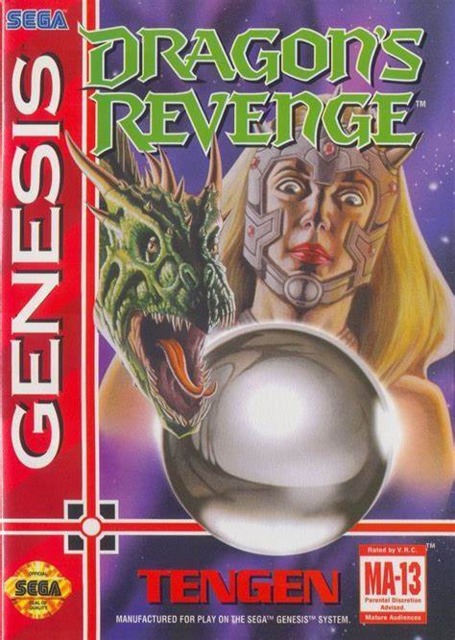
- Developer: Tengen
- Publisher: Tengen
- JP Release: 1993-12-10
- NA Release: November 1993
- EU Release: January 1994
- Franchise: Crash/Crush Pinball
- Genre: Pinball
- Theme: Dragon Deez (Pin)Balls Across Yo' Table
- Premise: The dragon got woke up by all the pinball you've been doing in his lair and, boy, he's just steaming mad is what.
- Availability: Virtual Console. It was on that while that was still a thing. Otherwise, best bet is probably just playing Demon's Tilt as it's mostly the same deal.
- Preservation: We have another Tengen game so soon after the last, and I'm happy to report that Dragon's Revenge is a better game than Awesome Possum (as hard as it might be to believe anything could be better than Awesome Possum). This is the sequel to Devil Crash a.k.a. Dragon's Fury, but it's one of those "in name only" sequels like the British Strider 2 where its original Japanese creators (Naxat/Compile, who were busy making Jaki Crush instead) are long gone and it's just plain ol' Tengen on both development and publishing duty. As with the previous game, it's some regular pinball couched in a dark fantasy aesthetic that occasionally tosses enemies on the field for you to roll over as well as a bunch of other business that you wouldn't see on a physical pinball table. I know pinball purists are always in two minds about that kind of stuff, but I generally prefer it when video game pinball takes advantage of the medium to introduce new features and ideas that wouldn't normally fly. Bonus points if Kirby's there. Kirby's not in this, I don't think, but then I didn't get too far in it.
- Wiki Notes: Skeleton, so it needed a lot of work.
500: F1 / Formula One
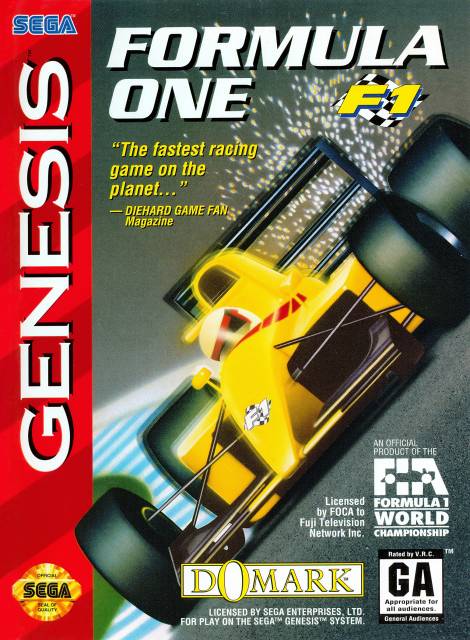
- Developer: Lankhor
- Publisher: Domark
- JP Release: N/A
- NA Release: November 1993 (as Formula One)
- EU Release: 1993-11-05 (as F1)
- Franchise: Formula 1
- Genre: Racing
- Theme: The Bass Riff From "The Chain" By Fleetwood Mac (In the UK, Anyway)
- Premise: Take pole position in the world's fastest racing series in this barebones approximation of Drew and Danny's favorite motorsport.
- Availability: If you're looking for a modern F1 game I believe there's a few.
- Preservation: I wish I had something more exciting for the 500th entry than this standard-ass Formula 1 racer. I think it has the shortest name of any Mega Drive game, if that's something? It's not? OK. I tried. (If this game was made today we would call that title "Search Engine Suicide".) So here's F1: it's nowhere even near the first F1 game on the system, which feels like the only way you could get away with calling your game just "F1". It's based on an Amiga game, though perhaps that goes without saying given the publisher, and we once again also have to credit UK companies Tiertex (sound) and The Kremlin (extra graphics) for some additional contract work. Lankhor isn't British though; they're French, and worked on a bunch of racing games before and after this game before going under in 2001 (we'll meet them one more time on Mega Archive). I have to admit, F1's got a decent framerate for a Genesis game with some basic polygons in it, but the rest of the presentation doesn't really do much for me; though most of that is because it's Formula 1 and that alone is enough to send me to sleep. What I will say is that it's the fifth best game I've ever played that shares its name with a keyboard key (after X, N, D, and Control).
- Wiki Notes: Another skeleton. Text, screenshots, releases, the whole shebang.
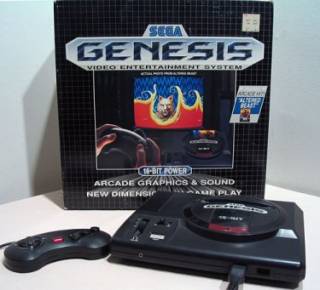
Log in to comment